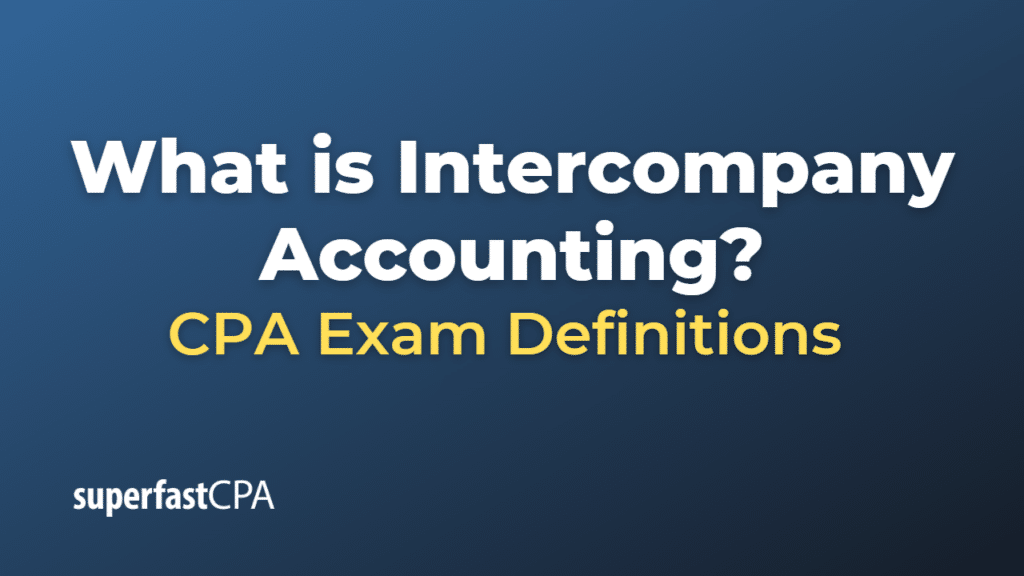Intercompany Accounting
Intercompany accounting refers to the process of recording financial transactions between different entities within a parent company. For example, if Company A (a subsidiary of a parent company) sells goods to Company B (another subsidiary of the same parent company), this would be considered an intercompany transaction and would need to be recorded appropriately in the financial books of both entities.
Intercompany transactions can take many forms, including sales of goods or services, loans, and allocation of costs. These transactions are common in organizations with a complex structure consisting of multiple divisions, subsidiaries, or related entities.
While intercompany transactions are a normal part of operations for many businesses, they add complexity to the financial accounting process. Here’s why:
- Recording Transactions: Each entity involved in an intercompany transaction must record the transaction in its own books. This can lead to discrepancies if the transactions are not recorded consistently.
- Elimination Entries: For consolidated financial reporting, intercompany transactions must be eliminated to avoid double counting. For example, if one subsidiary sells goods to another, this sale and the corresponding purchase must be eliminated upon consolidation, as they cancel each other out from a group perspective.
- Transfer Pricing: Prices for intercompany transactions (transfer prices) must be set at arm’s length (the price that would be set between independent parties) to ensure fairness and compliance with tax regulations. Mispricing can lead to tax and regulatory issues.
- Intercompany Reconciliation: At the end of a financial reporting period, entities must reconcile their intercompany transactions to ensure that they agree on the amounts and terms. Discrepancies can arise due to timing differences, exchange rate differences (if entities operate in different currencies), or errors.
- Regulatory Compliance: Different countries may have different rules regarding intercompany transactions, especially for tax purposes. Companies must ensure they comply with these regulations to avoid penalties.
Because of these complexities, many businesses use specialized intercompany accounting software or ERP systems to help manage and automate the process. Intercompany accounting is an essential area of focus for auditors and is a key part of ensuring accurate and transparent financial reporting.
Example of Intercompany Accounting
Let’s use an example to illustrate intercompany accounting. Let’s say we have a multinational corporation named TechCorp, which has two subsidiaries: TechUSA and TechGermany.
- In January, TechUSA sells $10,000 worth of hardware components to TechGermany. Both companies would record this transaction in their own books. TechUSA would record a $10,000 sale (increasing revenue), and TechGermany would record a $10,000 purchase (increasing expense).
- Later in the year, TechGermany uses these components to manufacture a product, which it sells back to TechUSA for $20,000. Again, both companies would record this transaction. TechGermany would record a $20,000 sale, and TechUSA would record a $20,000 purchase.
- At the end of the financial year, when TechCorp consolidates its financial statements, these intercompany transactions must be eliminated. This is because, from TechCorp’s perspective, it is essentially trading with itself, so these transactions don’t contribute to TechCorp’s overall revenue or expense.Therefore, the $10,000 sale from TechUSA to TechGermany and the $20,000 sale from TechGermany to TechUSA need to be eliminated in the consolidated financial statements. The net result of these transactions would be a $10,000 expense recorded on TechCorp’s consolidated income statement, which is the cost of the components originally sold by TechUSA.
- It’s important to note that the pricing of these transactions between TechUSA and TechGermany must adhere to transfer pricing rules. Tax authorities would require these transactions to be priced as if they were between independent entities, to ensure fair taxation.
- At the end of each period, TechUSA and TechGermany would need to reconcile their intercompany accounts to ensure they match. If there are discrepancies, such as due to timing differences or exchange rate fluctuations, these would need to be identified and corrected.
As you can see, intercompany accounting can add significant complexity to financial reporting, but it’s an essential part of accounting for corporations with multiple entities.













